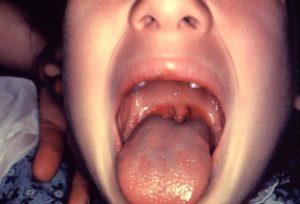
This image depicts a close intraoral view of a child’s inflamed oropharynx, which also included the patient’s soft palate, as well as tonsillitis, all which had been caused by group A streptococcus (GAS) bacteria. These bacteria are spread through direct contact with mucus from the nose or throat of persons, who are infected, or through contact with infected wounds, or sores on the skin. (Source CDC PHIL)
Strep throat caused by Group A streptococcus (GAS, also known as Streptococcus pyogenes) is one of the most prevalent infections with a high rate of morbidity. Recurrent episodes of strep throat are particularly common in children, where some develop recurrent tonsillitis (RT). Why some children develop GAS RT and what immunological features are associated with this remains a mystery.
Tonsils are lymph node-like structures that play a major role in induction of protective immunity against oropharyngeal pathogens. Since tonsils are one of the first anatomical structures to mount an adaptive immune response against oropharyngeal pathogens, RT could be due to dysfunctional immune responses in the tonsils. To examine this Dan et al., compared [phenotypic, functional & transcriptomic] immune responses between children who underwent tonsillectomies for GAS RT or non-infectious reasons [sleep apnea].
Children that suffer from GAS-RT would be expected to have higher GAS-specific antibodies, as a result of repeated antigen exposure during recurrent tonsillitis episodes. To their surprise Dan et al., observed lower GAS-specific IgG titers in GAS-RT children. Reduced antibody levels together with smaller germinal centers, lower TFH T cell and B cell frequencies suggests impaired induction of adaptive immunity in the tonsils of GAS-RT children. Immunoprobing of TFH cells in tonsils of GAS-RT, showed increased levels of Granzyme B and perforin expression in response to stimulation with GAS antigens. Expression of these cytolytic molecules was associated with increased cytotoxic activity against B cells.
In summary findings by Dan et al., suggest that recurrent GAS-tonsillitis in children is due to GAS-mediated impairment of immunity. Where repeated GAS stimulation of TFH cells [in tonsils] induces in cytotoxic activity against B cells resulting in lower GAS-specific IgG titres.
Journal Article: Dan et al., 2019. Recurrent group A Streptococcus tonsillitis is an immunosusceptibility disease involving antibody deficiency and aberrant TFH cells. Sci Trans. Med
Article by Cheleka AM Mpande











